Summary:
The Mediterranean diet has been strongly associated with a reduced risk of mortality and morbidity, such as cardiovascular disease, type 2 diabetes and cancer. The mediterranean diet is characterized by a high intake of olive oil, fruits, vegetables and nuts, a moderate intake of fish and poultry, and a low intake of dairy products, red meat, processed meats and sweets. It is thought that olive oil is what sets the mediterranean diet apart from other healthy diets. Virgin olive oil, which is the highest quality olive oil, has shown to have anti-inflammatory and antioxidant properties as well as beneficial effects on blood pressure and the heart. The aim of this paper was to assess the associations between common and virgin olive oil with long-term risk of death in a large sample of Spanish adults. The results showed that daily consumption of 1.5 tablespoons of virgin olive oil was associated with a one-third lower risk of all-cause death as well as half the risk of cardiovascular death. These effects were not seen for common olive oil that is not virgin, suggesting that virgin olive oil is best consumed to receive its health benefits.
Abstract:
Background: Evidence on the association between virgin olive oil (OO) and mortality is limited since no attempt has previously been made to discern about main OO varieties. Objective: We examined the association between OO consumption (differentiating by common and virgin varieties) and total as well as cause-specific long-term mortality. Methods: 2,161 individuals, representative of the Spanish population ≥18 years old, were recruited between 2008 and 2010 and followed up through 2019. Habitual food consumption was collected at baseline with a validated computerized dietary history. The association between tertiles of OO main varieties and all-cause, cardiovascular and cancer mortality were analyzed using Cox models. Results: After a mean follow-up of 10.7 years (129,272 person-years), 143 cardiovascular deaths, and 146 cancer deaths occurred. The hazard ratio (HR) (95% confidence interval) for all-cause mortality in the highest tertile of common and virgin OO consumption were 0.96 (0.75–1.23; P-trend 0.891) and 0.66 (0.49–0.90; P-trend 0.040). The HR for all-cause mortality per a 10 g/day increase in virgin OO was 0.91 (0.83–1.00). Virgin OO consumption was also inversely associated with cardiovascular mortality, with a HR of 0.43 (0.20–0.91; P-trend 0.017), but common OO was not, with a HR of 0.88 (0.49–1.60; P-trend 0.242). No variety of OO was associated with cancer mortality. Conclusion: Daily moderate consumption of virgin OO (1 and 1/2 tablespoons) was associated with a one-third lower risk of all-cause as well as half the risk of cardiovascular mortality. These effects were not seen for common OO. These findings may be useful to reappraise dietary guidelines.
Article Publication Date: 14/10/2022
DOI: 10.1038/s41430-022-01221-3



